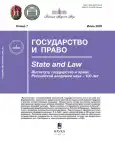Termination of the legal capacity of an individual: Issues of unification of law enforcement
- Authors: Mitsyk A.V.1
-
Affiliations:
- North-West Branch of the Russian State University of Justice
- Issue: No 7 (2025)
- Pages: 158-164
- Section: Scientific reports
- URL: https://journal-vniispk.ru/1026-9452/article/view/306373
- DOI: https://doi.org/10.31857/S1026945225070179
- ID: 306373
Cite item
Abstract
The validity of the termination of the “legal life” of an individual and the termination of his legal capacity is traditionally one of the cornerstones of domestic civilistics. A superficial perception of the institution of recognizing a citizen as deceased without deep understanding can be the basis for abuse of law. This postulate determined the choice of the topic of this study. The purpose of the study: to determine the moment of termination of the legal capacity of a person in a terminal state; to study the issue of recognizing a citizen who is being prosecuted as deceased in court. The objectives of the study are to determine the legal difficulties in determining the moment of termination of legal capacity of certain categories of individuals, to justify the need for unification of law enforcement in the field of termination of legal capacity. In addition to the general dialectical method, the work uses both general theoretical (mainly analysis, synthesis, system-logical) and specific scientific methods of cognition (historical, legal-analytical). In this paper, based on the analysis of the interpretation of current legal norms governing the moment of termination of legal capacity, specific proposals for the unification and uniform application of provisions on the termination of the legal capacity of an individual are formulated. The validity of the refusal to declare a citizen deceased in court, whose unknown absence is associated with the commission of a crime and the initiation of a criminal case, is motivated.
Keywords
About the authors
A. V. Mitsyk
North-West Branch of the Russian State University of Justice
Author for correspondence.
Email: lebedeva_av_85@mail.ru
5 Aleksandrovsky park, 197046 St. Petersburg
References
- Bulaevsky B. A. On the issue of declaring a citizen deceased // Commentary on judicial practice. Iss. 14 / ed. by K. B. Yaroshenko. M., 2008. P. 42 (in Russ.).
- Webers Ya. R. The main problems of the legal personality of citizens in Soviet Civil and Family Law: abstract … Doctor of Law. M., 1974. P. 15 (in Russ.).
- Civil Law: textbook / ed. by A. P. Sergeev, Yu. K. Tolstoy. M., 2004. Vol. 1. P. 95 (in Russ.).
- Dmitriev Yu. A., Shleneva E. V. The human right in the Russian Federation to euthanasia // State and Law. 2000. No. 11. P. 31 (in Russ.).
- Krylova N. E. Euthanasia: the criminal-legal aspect // Herald of the Moscow University. Ser. 2. Law. 2002. No. 2. P. 4 (in Russ.).
- Lyalin K. The right to die and euthanasia in foreign countries: practical aspects // Codex. 2002. No. 9–10. P. 17 (in Russ.).
- Mikheev R. I. Ways of scientific cooperation between lawyers and physicians at the turn of the century: proceedings of the conference “Medicine and Law”. M., 1999. P. 51 (in Russ.).
- Ostrovskaya I. V. Medical ethics: collection of documents. M., 2001. P. 48 (in Russ.).
- Panichkin V. B. Death as the basis for termination of legal capacity: a comparative analysis of the law of Russia and the USA // Civil Law. 2009. No. 4. P. 21 (in Russ.).
- Skorobogatova V. V. Legal personality of citizens in Russian Civil Law: abstract … PhD in Law. Yekaterinburg, 2010. P. 7 (in Russ.).
- Smolensky M. B. Legal capacity of citizens: features, grounds for occurrence and termination, and the role of a citizen’s place of residence and name in this process // Science and education: economy and economics; entrepreneurship; law and management. 2022. No. 8 (147). P. 92 (in Russ.).
Supplementary files










